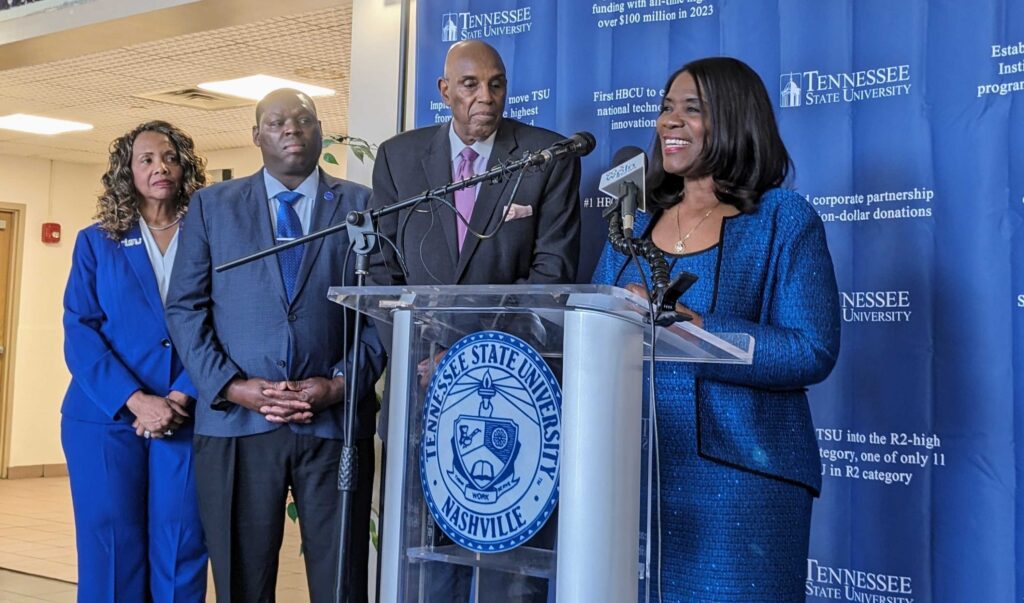
Tennessee State University’s president says she wants the state pay the school back for the $2.1 billion it was shorted in recent decades. A federal analysis released last week shows that TSU was the most underfunded of any historically Black public land grant institution in the country.
Land grant universities, like TSU and the University of Tennessee Knoxville, receive funding from the federal government that the state is supposed to match. The analysis found that Tennessee had failed to chip in its fair share to TSU between 1987 and 2020, resulting in the $2.1 billion figure.
More: Tennessee shorted TSU by more than $2B according to analysis from the Biden administration
“It is time to come to the table with a strategic plan of action that specifically involves payment,” said TSU President Glenda Glover in a press release.
So far, Gov. Bill Lee hasn’t outlined any concrete next steps to address the underfunding. But a statement from his office points to last year — when Tennessee invested a historic $250 million in the school for capital improvement projects. That was after a Tennessee legislative committee found that state had underfunded TSU by as much as $544 million.
In a statement, the governor’s press secretary wrote: “Gov. Lee will continue working with the General Assembly to invest in the success of TSU and all of Tennessee’s public colleges and universities, like he has since taking office nearly five years ago.”
Disagreement about how much is owed
Sen. Bo Watson, R-Hixson, chairs the Senate Finance, Ways and Means Committee. He agreed that Tennessee will continue investing in TSU.
“I think we’re already doing what the federal government has asked us to do,” he said. Like Lee, Watson pointed to last year’s quarter-billion-dollar allocation for TSU capital projects.
But Watson questions how the federal government arrived at its $2.1 billion figure.
“I’m not sure that their numbers are always as factual as they would like for you to believe,” Watson said. “So we will continue to use our (state) analysis as our as our guide.”
The federal government has offered to hold a workshop with the state to go over its calculations. In a release, Glover said she hopes the state accepts, and invites TSU to the table.
Watson acknowledged that offer during an interview, saying, “I think we will do our analysis and determine how much of a conversation we actually need.” He said he thinks the federal government should focus on passing its own budget “before they start dictating to the states what the states need to be funding.“
Watson also noted that Democrats controlled both chambers of the Tennessee General Assembly for many of the years analyzed by the federal government.
“It has been the Republicans that have been funding TSU at levels that exceeded anything that the Democrats ever funded when they had control,” Watson said.
Glover said in release that now is not the time to assign blame.
“The 33-years cited predates almost everyone at the capitol, but it’s never too late to do what’s right. Imagine how much greater TSU could be with equitable funding.”
TSU students are getting involved
 Courtesy TSU
Courtesy TSU TSU student leaders met with U.S Congressman Steny Hoyer in Washington, D.C. after a federal analysis revealed that Tennessee owes the university more than $2.1 billion.
A delegation of TSU student leaders has traveled to Washington D.C. to address the funding issue. The group met with members of the Congressional Black Caucus. According to a release, the student government association president and vice president spoke during one of the meetings.
SGA President Derrell Taylor called the underfunding “disheartening.”
“It is unfortunate that we have to fight this battle,” he said.
Chrishonda O’Quinn serves as TSU’s SGA vice president. She said the trip taught her how important it is to stay informed “so we can relay the information back to the students and have a stronger force when advocating in the Tennessee legislature.”

